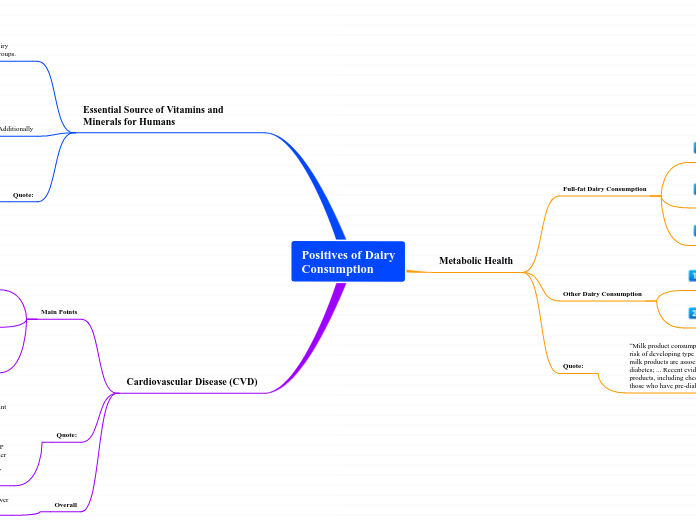Positives of Dairy
Consumption
Metabolic Health
Full-fat Dairy Consumption
Full-fat dairy has some benefits for metabolic health despite being high in calories, full-fat dairy is linked to reduced obesity.(Gunnars, 2018)
A large meta-analysis published in 2018 by Imamura et al. analyzed associations between fatty acid biomarkers of dairy consumption and the risk of developing diabetes (Imamura et. al, 2018)
Higher levels of the sum of these dairy biomarker fatty acids were associated with a 29% lower risk of type 2 diabetes (Imamura et. al, 2018)
Other Dairy Consumption
Total dairy product consumption was associated with an 11% lower risk of type 2 diabetes, comparing high to low intakes (Tian et al. 2017)
Yogurt consumption was associated with a 17% reduced risk of type 2 diabetes, comparing high to low yogurt intakes(Tian et al. 2017)
Quote:
“Milk product consumption is associated with a decreased risk of developing type 2 diabetes; Total dairy and low-fat milk products are associated with a reduced risk of type 2 diabetes; ... Recent evidence suggests that higher fat milk products, including cheese, may be especially protective in those who have pre-diabetes.” (Dairy Nutrition, n/a)
Essential Source of Vitamins and Minerals for Humans
Multiple randomized controlled trials show that dairy products lead to improved bone health in all age groups.
Childhood: Dairy and calcium lead to increased bone growth (Gunnars, 2018)
Adulthood: Dairy decreases the rate of bone loss and leads to improved bone density (Gunnars, 2018)
Elderly: Calcium supplements improve bone density and lower the risk of fractures (Gunnars, 2018)
Additionally
Milk that is fortified with vitamin D seems to be even more effective at strengthening bones. However, be careful with calcium supplements. Some studies have associated them with an increased risk of heart attacks It’s best to get your calcium from dairy or other foods that contain calcium, such as leafy greens and fish. (Gunnars, 2018)
Quote:
”The milk of each species of animal is a complete food for its young. Moreover, one pint of cow’s milk contributes about 90 percent of the calcium, 30 to 40 percent of the riboflavin, 25 to 30 percent of the protein, 10 to 20 percent of the calories and vitamins A and B, and up to 10 percent of the iron and vitamin D needed by a human adult. ” (Encyclopædia Britannica, 2020)
Cardiovascular Disease (CVD)
Main Points
Milk products are associated with a reduced risk of cardiovascular disease and High-fat milk products have a neutral or beneficial association with cardiovascular disease (Gunners, 2018)
Yogurt and cheese are associated with a reduced risk of cardiovascular disease including heart disease and stroke (Gunners, 2018)
Several nutrients and other components may explain the beneficial role of milk products on cardiovascular health. These include: calcium, vitamin D, protein, bioactive peptides, fatty acids (Gunners, 2018)
Quote:
“During an average follow-up time of 14.4 years, 177 participants died, including 61 deaths due to CVD and 58 deaths due to cancer. There was no consistent and significant association between total dairy intake and total or cause-specific mortality. However, compared with those with the lowest intake of full-fat dairy, participants with the highest intake (median intake 339 g/day) had reduced death due to CVD (HR: 0.31; 95% confidence interval (CI): 0.12-0.79; P for trend=0.04) after adjustment for calcium intake and other confounders. Intakes of low-fat dairy, specific dairy foods, calcium and vitamin D showed no consistent associations.” (Bonthuis et. al, 2010)
Overall
People who consumed the most full-fat dairy had a 69% lower risk of heart disease (Gunners, 2018)
